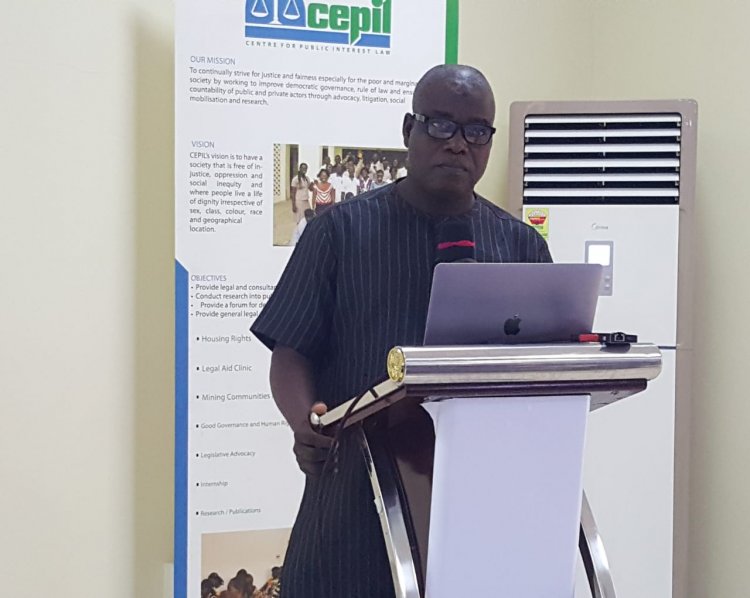Manual On Human Rights For CSOs, Journalists Launched
The manual provides practical guide on prevention and mitigation measures for CSOs, and HRDs who are often faced with risk situations.

A Manual on Human Rights and Legal Protection Protocols for Civil Society Organisation (CSO) partners, staff and human rights defenders (HRDs) including journalists has been launched in Accra.
The manual provides practical guide on prevention and mitigation measures for CSOs, and HRDs who are often faced with risk situations.
It also contains legal and constitutional safeguards, provisions of fallback mechanisms and relevant support systems to create an enabling environment for protection of HRDs and CSO advocates.
The human rights manual was launched by a not-for-profit organisation, Centre for Public Interest Law (CEPIL), in collaboration with Oxfam in Ghana, at a media capacity building and engagement forum on Tuesday, August 21, 2023.
Participants at the launch were drawn from representatives of media houses and civil society organisations.
Addressing the participants, the Executive Director of CEPIL, Lawyer Augustine Niber, said the media and CSOs play crucial roles in promoting and protecting human rights and strengthening the rule of law.
However, he said journalists and CSO advocates do this at high risk to themselves, their families and communities and the organisations they represent, hence the shrinking of the civic space.
He attributed the shrinking of the civic space to the increasing reports of human rights abuses against media practitioners and CSO advocates whose job focuses more on defending the rights of others.
According to him, these human rights abuses have included violations, physical attacks, right abuses and threats to integrity of human rights defenders.
He explained that it was against the backdrop of attacks on HRDs that CEPIL and Oxfam in Ghana developed this manual to help improve on the protection of HRDs and those involved in influencing.
For his part, Lawyer Alhassan Iddrisu, a speaker at the forum, noted that both CSOs and media must be given the “freedom” to work.
He indicated that the role of the media and CSOs in defending the rights of others cannot be underestimated.
He said the 1992 Constitution provides protection of the media and every Ghanaian citizen, urging the participants to take the manual seriously.
“…the Constitution provides the protection of the media and of every person in Ghana so we have highlighted all this in the manual as a guide in our work, and we must take it seriously because our lives matter. We don’t need to continue to lose the lives of human rights defenders who include media practitioners,” he averred.
He, therefore, stressed the need for journalists to be protected to enable them promote Ghana’s democracy, human rights and also serve as advocates for the vulnerable.
Lawyer Iddrisu said HRDs in the course of their work are confronted with very high risks which sometimes cut short their lives.
He sadly recounted that in 2019 over 281 human rights defenders lost their lives in this country while in the line of duty.
“I mean they don’t have any personal motive; what they seek to do is to protect the lives and human rights of the vulnerable in our communities. And, therefore, the state that is a signatory to the United Nations Declaration has a duty and a mandate to protect the rights of these Human Rights Defenders. And these include media, CSOs, lawyers, anti-corruption crusaders. We all are important and our lives matter as we also work towards protecting and promoting the human rights of the vulnerable in society,” he said.
On what journalists must do to prevent attacks on them, Lawyer Iddrisu advised the media to assess every situation, especially those involved in investigative journalism.
“This is because they (referring to investigative journalists) go to isolated places to bring news. They endanger their lives going to people’s homes, offices for interviews, to collect data, and information for the consumption of the public. Therefore, they must be aware that as they do this their lives matter and must exist to continue to do the work, and risk assessment should be used to assess every situation, and must equally abide by their ethics,” he cautioned.
Earlier, Lawyer Iddrisu took the participants through presentations on “Understanding the Challenges and Experiences in Human Rights Advocacy and Influencing Work” and “The Role of Human Rights and Legal Protection Protocols in Pursuit of Justice and Human Rights Advocacy.”
In a brief remark, the Technical Director of Wacam, a human rights and environmental mining advocacy NGO, Lawyer Kwaku Afari, applauded CEPIL and its partners for the development of the manual.
He stated that the manual will help HRDs and CSO advocates to fight human rights abuses, adding that “as human rights defenders we should also look at how best we can extend this manual to our other areas of life,” he submitted.
Furthermore, he urged the media to shed more light on communities affected by mining activities, bemoaning that residents in these communities continue to face open abuse of their rights. The participants received copies of the manual.

 Freeman Koryekpor
Freeman Koryekpor 



































